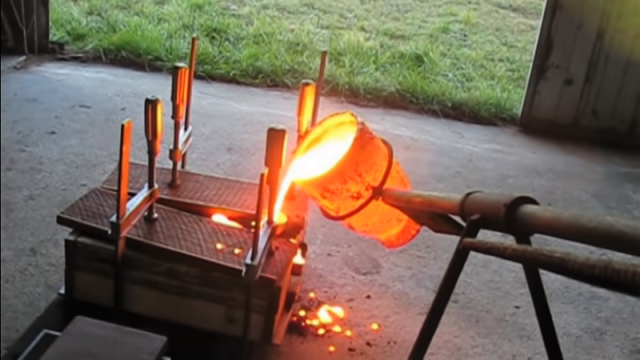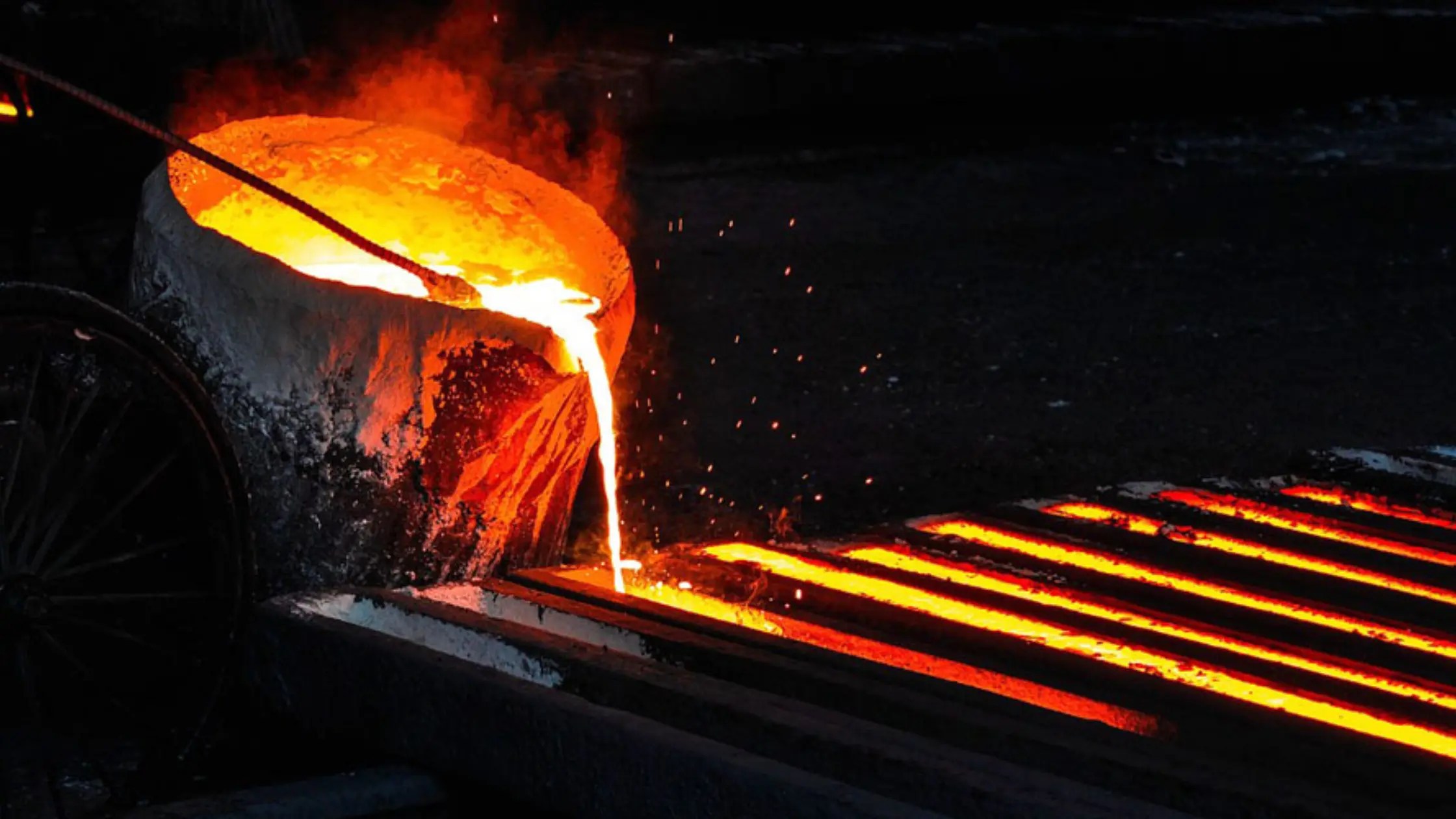What Artists Can Learn from the Artistic Side of Metal Casting
Wiki Article
A Comprehensive Overview to Metal Casting: Benefits and Providers Used by Foundries
Metal casting is an important process in numerous industries, supplying various advantages via the services of shops. These facilities change molten metal right into resilient and accurate parts, dealing with certain customer requirements. By using advanced modern technologies, factories assure quality and efficiency in production. Nevertheless, the intricacies of metal casting and the diverse strategies involved increase important concerns concerning its role in modern manufacturing. What advancements exist ahead in this vital area?Understanding the Metal Casting Process
The metal casting process is a basic technique utilized in manufacturing to create complex shapes and components. This method involves pouring molten metal right into a mold and mildew developed to develop the preferred object. The process begins with pattern development, which offers as a design template for the mold. Metal Foundry. Numerous products, such as sand, metal, or ceramic, are utilized for mold-making, relying on the particular requirements of the casting
When the mold is ready, molten metal is poured right into it and enabled to cool and solidify. After solidification, the mold is removed, disclosing the actors part. Different techniques, consisting of sand casting, investment casting, and die casting, are used, each fit to different applications and materials. Quality assurance procedures, such as inspections and testing, are vital to ensure the end product fulfills specifications. In general, the metal casting procedure plays an essential duty in creating parts for sectors varying from vehicle to aerospace.
Key Perks of Metal Casting
Metal casting provides substantial advantages that make it a preferred manufacturing technique in different industries. Its style versatility and precision enable for complex shapes, while cost-effective automation boosts performance. In addition, the flexibility and strength of products utilized in casting add to the toughness of the end products.Style Versatility and Accuracy
Releasing exceptional layout flexibility and accuracy, metal casting allows engineers and designers to create complex shapes and attributes that would certainly be difficult or difficult to achieve with other manufacturing methods. This capacity makes it possible for the manufacturing of intricate geometries, interior structures, and great details that boost item functionality and looks. In addition, various casting strategies, such as sand casting, investment casting, and die casting, provide more options for personalization, fitting diverse material properties and project requirements. The adaptability of mold and mildews allows modifications throughout the style phase, enhancing the change from concept to final product. Ultimately, metal casting stands apart for its capacity to supply high-precision components, making it an invaluable process in sectors varying from auto to aerospace and beyond.Cost-Effective Automation
Affordable mass production stands as one of the primary benefits of metal casting, allowing manufacturers to produce big amounts of parts at a reduced expense per device. This performance emerges from the capacity to create detailed mold and mildews that can be recycled numerous times, significantly lowering arrangement and functional prices. Furthermore, metal casting processes, such as sand casting and die casting, permit high throughput, making it practical to fulfill the needs of large-scale manufacturing runs. The decreased material waste and power intake even more enhance cost financial savings, making metal casting an appealing choice for industries requiring bulk parts. Generally, the economical nature of metal casting settings it as a recommended method for producers going for financial performance in their production processes.Product Adaptability and Toughness
One of the standout features of metal casting is its remarkable product versatility, which permits for the use of a wide variety of metals and alloys. This adaptability enables suppliers to select products that ideal match their specific applications, from aluminum and bronze to iron and steel. Each metal provides special properties, including varying levels of toughness, corrosion resistance, and thermal conductivity. Metal casting can create elements that meet strict efficiency demands throughout diverse sectors, such as vehicle, aerospace, and building and construction. Additionally, the stamina of cast metals can be improved via numerous therapy processes, guaranteeing durability and longevity. Aluminum Foundry. In general, the mix of product adaptability and integral strength makes metal casting a recommended choice for producing high-quality elementsSorts Of Metal Casting Techniques
Metal casting encompasses a variety of strategies that provide to various production requirements and material residential properties. Usual approaches consist of sand casting, which uses a sand mold for complex shapes, and investment casting, understood for its accuracy and surface area finish. Die casting is one more strategy that utilizes high-pressure shot of liquified metal into mold and mildews, ideal for automation of tiny components.Shell molding supplies a quicker alternative, making use of a resin-coated sand to develop thin-walled molds, while lost foam casting enables detailed layouts without the need for a core.
Additionally, constant casting is made use of for producing long areas of metal, such as bars or sheets, by strengthening liquified metal in a continuous procedure. Each technique is and provides unique advantages selected based upon aspects like the called for detail, production volume, and material kind, guaranteeing exceptional end results in metal manufacture across numerous sectors.
The Function of Foundries in Metal Casting
Shops play an essential role in the metal casting process, functioning as the facilities where liquified metal is Web Site transformed right into finished items. These specialized establishments are geared up with the necessary devices and innovations to handle various metals, guaranteeing high-quality results. Foundries are accountable for several important features, including thawing the metal, putting it right into mold and mildews, and enabling it to strengthen.Furthermore, they preserve rigorous security and ecological requirements to secure employees and minimize environmental impact. Knowledgeable service technicians and designers team up to maximize casting processes, enhancing efficiency and lowering waste. Factories also participate in quality control steps, making certain that the final products satisfy certain resistances and specs. This high quality assurance is important for markets that depend on specific components, check my source such as automobile and aerospace. Therefore, foundries contribute substantially to the general production landscape, allowing technology and development throughout numerous markets.
Custom Metal Casting Providers
Custom-made metal casting solutions offer tailored style options that meet particular client demands. These solutions likewise provide material option experience, ensuring the appropriate metal is selected for the preferred application. Such adaptability and expertise enhance the total quality and efficiency of the end product.
Customized Design Solutions
Customized design services in metal casting supply makers with the flexibility to create components that satisfy specific efficiency and visual requirements. Factories provide tailored services that allow customers to specify measurements, shapes, and surface area finishes to accomplish preferred end results. This modification procedure typically consists of partnership between engineers and developers, ensuring that the final items align with operational needs and sector standards. Advanced technologies, such as computer-aided layout (CAD) and simulation software, make it possible for specific modeling and screening of elements before production, decreasing mistakes and boosting efficiency. By leveraging tailored design solutions, companies can maximize functionality while decreasing waste and prices, eventually bring about an extra one-upmanship out there. This adaptability is important for industries needing unique applications and requirements.Material Option Competence
When choosing materials for metal casting, competence plays a necessary function in making sure that the right choice straightens with both efficiency requirements and cost-effectiveness. Shops employ proficient specialists that comprehend the buildings of numerous steels and alloys, allowing them to recommend optimal materials for particular applications. Aspects such as toughness, corrosion resistance, and thermal conductivity are meticulously taken into consideration to satisfy the client's demands. Furthermore, market patterns and innovations in product scientific research educate these decisions, enabling factories to remain competitive. By leveraging their expertise, factories can aid customers in steering through complicated material alternatives, eventually leading to improved item top quality and reduced production expenses. This specialized knowledge is essential for accomplishing successful results in custom metal casting services.Top Quality Control in Metal Casting
Quality control in metal casting is important to assure that the end products fulfill the required specifications and efficiency requirements. Shops use a variety of techniques and methodologies to ensure the best of actors parts. This procedure begins with rigid product examinations, confirming that raw materials follow industry standards. Throughout the casting process, real-time tracking and testing are performed to evaluate parameters such as temperature level, mold stability, and dimensional accuracy.
Applications of Metal Castings Throughout Industries
Metal spreadings play an essential duty in different industries, functioning as the foundation for plenty of applications. In the auto market, cast elements such a knockout post as engine blocks and transmission real estates are essential for lorry performance and reliability. The aerospace sector depends on precision castings for crucial components that ensure safety and performance in flight. In addition, the construction sector uses metal castings for fixtures, fittings, and architectural elements, improving the durability of structures and facilities.The power industry advantages from castings utilized in turbine blades and other equipment essential for power generation. The medical area also makes use of metal castings in instruments and gadgets, showing the adaptability of this production process. Generally, metal castings are indispensable to the capability and improvement of diverse sectors, showcasing their significance in modern-day innovation and facilities development
Often Asked Concerns
What Products Are Frequently Utilized in Metal Casting?
Common products used in metal casting consist of aluminum, iron, steel, bronze, and brass. Each material offers one-of-a-kind residential properties ideal for numerous applications, permitting manufacturers to select the very best option based upon stamina, weight, and corrosion resistance.The length of time Does the Metal Casting Process Generally Take?
The metal casting process typically takes a number of hours to a few days, depending on elements such as the intricacy of the design, sort of metal made use of, and the details casting method employed by the foundry.
What Is the Environmental Influence of Metal Casting?
The ecological influence of metal casting includes energy consumption, exhausts, and waste generation. Factories usually implement procedures to reduce these effects, such as reusing products and using cleaner innovations to lower their ecological impact.Can Metal Casting Be Done for Small-Scale Projects?
Metal casting can without a doubt be carried out for small-scale projects. Different factories cater to such demands, using customized remedies that fit restricted manufacturing runs while keeping high quality and precision in the last products.What Are the Precaution in Metal Casting Foundries?
In metal casting factories, safety and security steps consist of individual protective equipment, proper air flow, training on equipment usage, emergency situation treatments, normal upkeep checks, and adherence to industry security requirements to reduce risks connected with liquified metal and unsafe materials.In addition, metal casting processes, such as sand casting and die casting, enable for high throughput, making it feasible to meet the needs of large-scale manufacturing runs. One of the standout features of metal casting is its exceptional material versatility, which allows for the use of a broad array of alloys and steels. In addition, constant casting is utilized for producing long sections of metal, such as bars or sheets, by solidifying liquified metal in a continuous procedure. Shops play a crucial role in the metal casting process, offering as the centers where molten metal is changed right into completed products. Common products utilized in metal casting include aluminum, iron, bronze, brass, and steel.
Report this wiki page